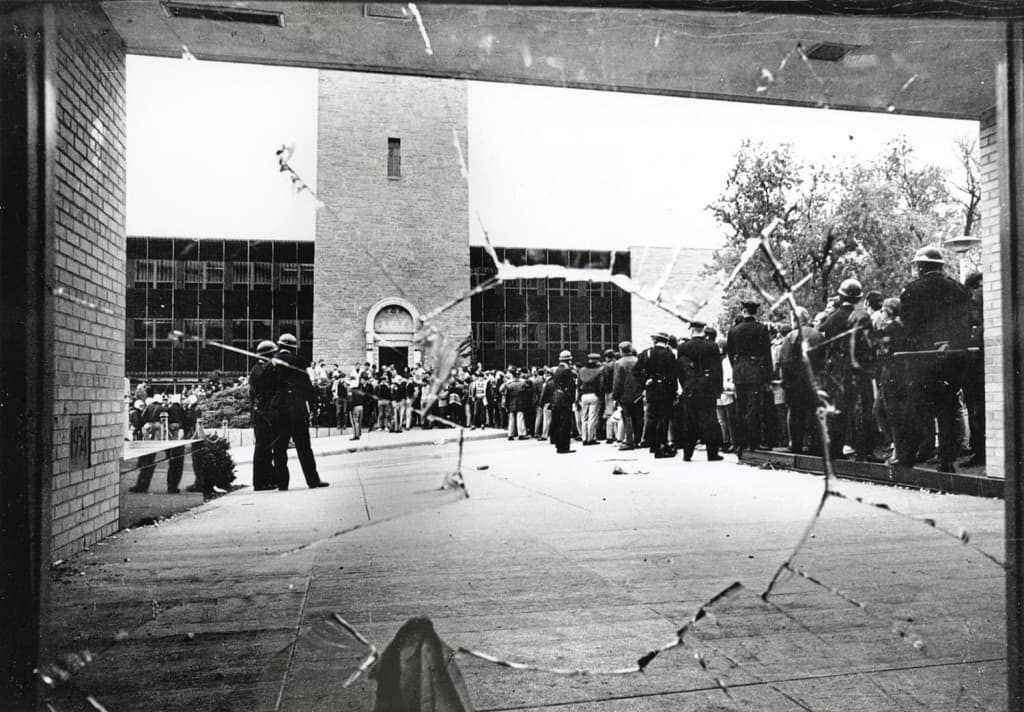
Dear Retrospect readers: This post is criminally long. It’s part of a larger work in progress, so the story arc stretches beyond reasonable reader expectations. Please read as much or as little as you want.
Mao Tse Tung, Uncle Ho / Dow chemical has got to go
— Gratefully yours, CD
We arrived at Madison on a Friday afternoon in October. An SDS kid met us at the gate with a permit and led us along the walkways to the theater. A city motorcycle cop showed up. The kid showed him our permit. The cop gave us a dirty look and left.
“City cops around a lot?” the director asked the SDS kid.
“We been on the streets a lot this fall,” the kid said. “Dow chemical gave the university big grants last year.”
“For what?” we asked.
“To make napalm stickier.”
“Stickier?”
“Yeah, so it sticks to the skin better and for longer. While it’s burning. That’s the trick, see? To make it stickier and hotter. Like phosphorous.”
“You know a lot about it,” we said.
“We all do,” the kid said.
We pulled the van up to the loading dock and went inside. It was a good theater, proscenium, with a sprung stage floor. A techie met us. He started talking to our techie, bragging about the new light board and grid. It was a nice theater, and the funky little commedia stage would look great, framed by the proscenium.
We had a routine for unloading and setting up, and it was the first that the students saw of our road company, very together, very boisterous, invading the academic sanctum. We pulled the two uprights and the crossbeam off the top of the truck, shouldered them through the backstage loading dock and laid them down upstage.
Next came our outdoor stage platforms, stacked to the side. We set the pylons and the two-by-six support beams onstage where our funky little stage-upon-a-stage would sit best, lined up under the light grid. Next came the platforms, two actors on each, laid onto the frame. Wedges jammed the platforms tight together. We bolted the cross bar to the two uprights and lashed the curtain onto the crossbeam.
The curtain, crude canvas, split in the middle for grand entrances, was painted with a two-dimensional village in shallow perspective, no naturalism anywhere. Above that, we stretched a banner — “San Francisco Mime Troupe — Engagement, Commitment, and Fresh Air” carried by a snarling, toothy gothic griffin. When assembled, we lifted the whole rig upright with a big cheer and tied it off to stage weights and cleats. Outdoors, we’d just drive stakes into the ground.
I walked up to the back of the theater for a look. Our stage looked small, incongruous, the perfect effect against the grandiose theater that surrounded it. The drop curtain was laughable. It destroyed any pretense of proscenium, any expectations of a normal night at the theater. That was a good thing.
We dropped our coats — outdoors the autumn had grown cold in the Midwest — and clambered on stage. The tech guys began to light our little stage from the grid while we tried out the floor. Actors warmed up offstage, out from under the techies and their heavy lights. Play some music, somebody shouted to the techs. Just don’t make it “If You Go to San Francisco” or “On a Warm San Francisca Night,” a ridiculous song. There are no warm San Francisco nights. None. Ever.
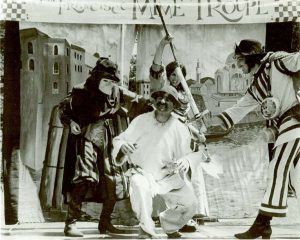 We did some lazzi, stock commedia physical sequences, practicing falls and leaps on the floor, short physical bits. By now, we had the show down. Although it changed every night in its tempo, details, and audience response, the show, “L’Amant Militaire,” the military lover, had congealed into a funky ballet, at once orchestrated and improvisational. Within limits, you could change beats, insert ad libs if you didn’t break the rhythm. If you ad libbed and blew it, you’d hear about it. A good ad lib works well, but only when it’s linked to the scene’s overall context. There would be no question when it worked, because the audience would explode. Or we could do joke-jokes, laugh catchers where we’d throw in a reference to a hit tune or a San Francisco band, or an irksome professor on campus or insert some mention of dope or a popular villain like General Waste More Land the commander in charge of the 500,000 U.S. troops in Vietnam. Sex was built into the characters, their relationships, the movement. It was a very bawdy, very sexy play.
We did some lazzi, stock commedia physical sequences, practicing falls and leaps on the floor, short physical bits. By now, we had the show down. Although it changed every night in its tempo, details, and audience response, the show, “L’Amant Militaire,” the military lover, had congealed into a funky ballet, at once orchestrated and improvisational. Within limits, you could change beats, insert ad libs if you didn’t break the rhythm. If you ad libbed and blew it, you’d hear about it. A good ad lib works well, but only when it’s linked to the scene’s overall context. There would be no question when it worked, because the audience would explode. Or we could do joke-jokes, laugh catchers where we’d throw in a reference to a hit tune or a San Francisco band, or an irksome professor on campus or insert some mention of dope or a popular villain like General Waste More Land the commander in charge of the 500,000 U.S. troops in Vietnam. Sex was built into the characters, their relationships, the movement. It was a very bawdy, very sexy play.
Once the stage was lit and the techies were off the grid above us, we ran a speed through, very fast, very fun, stretching and twisting, keeping on cue but whipping through it. This was a time of invention. The best work came out of these light, quick run-throughs. Then we’d go to eat, usually at some student commons, or a restaurant with the organizers, all of them SDS members.
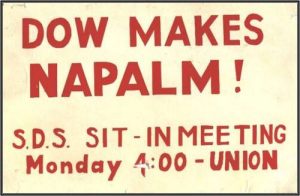 The plan was to use the show as a rallying point for the organized protests that were unfolding on every campus, often based on the battle against Dow Chemical, Hewlett-Packard, the napalm brewers and the cluster bomb makers, cruel corporations. And ROTC. Rot Cee. Reserve Officers Training Corps. More ninety-day wonders came out of ROTC than anywhere else, the scared or arrogant lieutenants who commanded the platoons in battle, often leading with their dicks instead of their heads. College kids getting their young troops killed. So SDS’s idea was to get the military recruiters off the campus. We talked the SDSers about their politics and strategy but there was very little ideology to discuss. we were all on the same page.
The plan was to use the show as a rallying point for the organized protests that were unfolding on every campus, often based on the battle against Dow Chemical, Hewlett-Packard, the napalm brewers and the cluster bomb makers, cruel corporations. And ROTC. Rot Cee. Reserve Officers Training Corps. More ninety-day wonders came out of ROTC than anywhere else, the scared or arrogant lieutenants who commanded the platoons in battle, often leading with their dicks instead of their heads. College kids getting their young troops killed. So SDS’s idea was to get the military recruiters off the campus. We talked the SDSers about their politics and strategy but there was very little ideology to discuss. we were all on the same page.
After we ate, a few of us set off to the radio station to promote the show. So far on this tour, the SDS organizers had their shit together to dovetail the shows into whatever student action was planned for the campus that weekend. By design, we would act as a spark plug to fire up the students with laughter and thought provocation. It felt important. Every moment felt like a teaching moment, but we didn’t see it as a top-down thing. While our show was military-tight and organized, anarchy ruled our threadbare theater’s soul. The way we lived fed into the way we performed. The theater came out of our lifestyle and our lifestyle fed the content of the theater.
We lived the life of bandits but conducted ourselves like guerrilla fighters. We knew why we were there, and we understood and respected the students and their circumstances. Ours were hit-and-run tactics, but the students had laid the groundwork for what was about to happen, and they would take the consequences after we had gone.
All across the nation, SDS, Students for a Democratic Society had been at work for over a year, feeling their way into unity and collective action via remarkable communication, FBI-tapped phonelines, mimeographed leaflets, bundles of New Left Notes distributed from east to west by bus, truck, whatever. Hell, we’d carry bundles of New Left Notes in our van to the next campus.
Plus, nearly every city in America had an underground paper, most run for political and cultural organizing, all of them contributing to the communication for a nationwide student movement, the most powerful we had seen in this country, ever. You could feel the power, rolling out ahead of us.
*
Showtime! We walked onstage. Unlike proscenium shows, the set was designed to break the fourth wall that stands between actors and their audiences. The audience had piled into the classy theater, dark wood panels, well-kept theater seats, a rich green. By contrast to the formality of the room, the students mixed preppies in chinos and sport jackets with bushy-haired freaks in jeans and ragged tops, long dresses and black pipe stem pants.
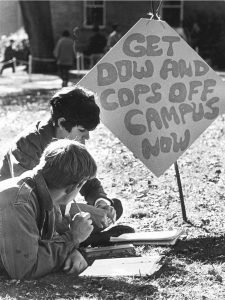 The kids were jazzed up. SDS had done a remarkable job of getting them organized and prepared for what would come tomorrow. The students were incredibly savvy about the war and the role the universities played in keeping the war machine going. No dupes here. They radiated energy and noise and they filled the staid hall to overflowing.
The kids were jazzed up. SDS had done a remarkable job of getting them organized and prepared for what would come tomorrow. The students were incredibly savvy about the war and the role the universities played in keeping the war machine going. No dupes here. They radiated energy and noise and they filled the staid hall to overflowing.
Onstage, we formed our warmup circle, lots of spontaneous smiles and eyes. We were on! The commedia had not yet begun, but we were singing beside the stage. This gleeful breaking of expectations gave the warmup a naturally raucous, lascivious style and I loved preparing. Students ricocheted off the walls. They danced in the seats. All we had was a recorder, a tambourine, and five sets of hands to accompany our voices but the audience joined with whistles and shouts.
The audience loved the show and left the theater clapping and chanting. They flowed around the campus cops who weren’t prepared for a rowdy, post-show mob that clamored across campus toward the chem building, where the university was conducting napalm experiments. Everybody danced and cheered and shouted around the chem building entrance, a big crowd, but no one tried to assault the doors. This was no unruly mob. That’s what The Man liked to call these protestors, as if they were a large infesting insect. Shortly, “the mob” broke, groups and couples heading in different directions. Our SDS hosts guided us off-campus to a joint with initials carved deep into the tables, pizza, burgers, and pitchers of beer carried above the heads of waitresses weaving through the standing-room only crowd.
*
The next morning, we showed up at the SDS office, our rendezvous point. Everyone hit the mark on time. This was guerrilla theater: We had learned our coordinates and kept our ammunition dry. The Chancellor had refused to discuss demands written up by students. Because the university had chosen war research funding over their mission to educate the young citizens of Wisconsin, the students had decided to occupy the chem building where the napalm research was going on. We would provide a drum and bugle corps to march the protesters into the building. We had a snare drum, a trumpet, we had tambourines and whistles. We marched across campus as students poured out of the dorms and reached critical mass at the foot of the granite stairway that led majestically up to the heavy double doors of the administration building.
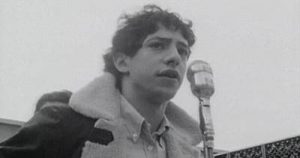 Two young women draped a hand-painted graphic of a clenched fist over a podium liberated from a lecture hall. An scruffy kid dressed in jeans, a faded blue work shirt, and a sheepskin jacket stepped up. A long-haired student set a microphone down in front of him. An extension cord trailed out of the back of a Fender guitar amp and slithered up the steps to a window in the chem lab.
Two young women draped a hand-painted graphic of a clenched fist over a podium liberated from a lecture hall. An scruffy kid dressed in jeans, a faded blue work shirt, and a sheepskin jacket stepped up. A long-haired student set a microphone down in front of him. An extension cord trailed out of the back of a Fender guitar amp and slithered up the steps to a window in the chem lab.
“We all know why we’re here,” he began. Feedback whined. He cringed, looked at the microphone, tapped it. Leaned aside. The kid adjusted the volume.
“It’s not just because we posted flyers and handed out leaflets about this action today.”
Cheers.
“Okay, we’re on,” the speaker said, grinning. “Sure that was helpful, but we all know that the chem building is no longer a place of science. It’s a munitions lab. And the bosses of this supposedly sheltered academic community, they no longer represent our well-being. Now they collaborate with war mongers. They take money from the war corps and tap the brain power of who? Of us! They hold out diplomas like carrots in front of mules and tell us “do the work. Do THIS work. Use your hard-earned knowledge, your love for science to fulfill our government research grants. And the people who come to work each day, dressed like academics, like our benign, beloved betters. They use the standards of academia to pressure us — yeah, that’s right — ‘pressure us’ into making the napalm burn hotter, make the cluster bombs tear more flesh.”
The crowd boo’d. It was clear that they — students and organizers — had been meeting frequently. The crowd stood attentive, knowing they wanted to hear what this guy had to say. I felt the unity, all these kids understanding the power behind the words, the concepts becoming real, a matter of life and death, even for them.
“And they all know — like I know. Like you know. That those nice people, so many so friendly, so sincere in their efforts to help us.”
The crowd groaned with sarcasm.
The speaker stopped them. “No! No!” he shouted. “They’re sincere. Sincere in their intent to keep the wheels turning here at the university. But now, the wheels have reversed direction. They are no longer about academia, the gift of education, the treasures of knowledge. Now the wheels turn as gears of the military-industrial complex.”
The speaker paused. He looked out over the crowd. No one moved. None had left. He crouched over the microphone, lowering his voice. “They’re keeping a list, brothers and sisters. A list of those of us who may stumble, even for a moment. Those of us who may — for whatever reason — not be at the top of our academic game. And that list goes to the warmongers.”
Boos.
“That list goes to the selective service. To the draft boards. To those who decide who l will go and who will stay. To those who can tear us from the halls of the university and drop us in the barracks and in the rice paddies and deep in the blinding jungle. Yeah, the big wheel keeps on turning, brothers and sisters. And the halls of ivy — that once crooned the harmonies of student life — now glisten with blood and burn with fire.
“They want us, these men at the induction center. The sergeants and the doctors. Waiting to stamp our asses like pieces of meat. G.I. G.I. Government issue. We are no longer the issue of our parents. We are no longer the issue of our hopes and dreams.
But there comes a time when we must turn this university away from its dark new identity as a factory of death. A time when we must stop the manipulation of our hearts and minds and bodies from the place we were born to become both the murdered and the murderers. While they make money off our successes and our failures.
The crowd began a chant. The chant began to move, in tempo, like a single organism. We picked up the tempo on drums and bells began to march behind the great prowling animal that took direction and danced across the campus to the chem building.
One two three four
We won’t fight your dirty war
Mao Tse Tung And Uncle Ho
Dow chemical has got to go.
We formed up at the back of the crowd as we had done so many times in the parks of San Francisco. But this time, we weren’t passing the hat, fleecing the audience for spare change and joints. We were playing the students into a building to sit on the floor in peaceful resistance, where they would sing. But we were no pied pipers.
“Stay outside,” the director told us. “Don’t go in.”
“But we can’t just march them in there and then leave.”
“Oh yeah?” the director asked. “And what happens if they get busted while we’re in there?”
“Then we get busted.”
“And then what?”
“No show.”
“That’s right.”
“So we drive all the way to Madison, our mission barely begun.”
“And we end up here in jail.
The director laughed. “Some guerilla action.”
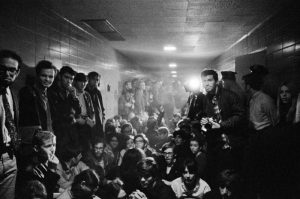 During this exchange, the students knew what to do. Someone had crawled in a window in the chem building. She shoved open the front door. Chanting, the students had rolled into the building. We could see them hunkering down in the front corridors. The doors slammed shut.
During this exchange, the students knew what to do. Someone had crawled in a window in the chem building. She shoved open the front door. Chanting, the students had rolled into the building. We could see them hunkering down in the front corridors. The doors slammed shut.
Minutes later, phalanxes of cops appeared from around the corners of nearby buildings. They were outfitted in coveralls and helmets, gas masks strapped to their legs, gloves, heavy boots, and long night sticks. Really long night sticks. We retreated to the pedestal of a statue of Abraham. He had been adorned with a gas mask.
Inside, the students jammed the doors with baseball bats thrust under the push bars. Chains rattled through the door handles. They had come equipped.
A bullhorn blared from the police phalanx. The speaker, without identifying himself, declared the students as an unlawful assembly and ordered them to disperse.
Mao Tse Tung and Uncle Ho
Dow chemical has got to go!
Another bullhorn announcement.
More cheering and singing from inside the building
A shattering sound. Broken glass cut through our drum and bugle tattoo. Unable to force the doors, Madison’s eager, newly equipped tac squad broke through the glass at the entrance.
The dull thud of tear gas. The pigs shot canisters directly into the narrow confines of the chem building hallways.
 People began to scream, their cries muffled but intense behind the doors and the shouts of the pigs. They began to drag students out of the chem building by the first available limb. Tear gas splintered the clear autumn air with glass shards. They clubbed, kicked, and dragged students toward two large black vans, super-sized paddy wagons. Shaking off the shock of the attack, the students rallied and counterattacked. They swarmed around the paddy wagons and prevented the pigs from closing the doors. They began rocking the vehicles and someone punctured the tires on both vans. Fire broke out under first one, then the other of the vehicles. The pigs flung open the doors and the students leapt out, only to be forced to run a gauntlet of pigs and their night sticks.
People began to scream, their cries muffled but intense behind the doors and the shouts of the pigs. They began to drag students out of the chem building by the first available limb. Tear gas splintered the clear autumn air with glass shards. They clubbed, kicked, and dragged students toward two large black vans, super-sized paddy wagons. Shaking off the shock of the attack, the students rallied and counterattacked. They swarmed around the paddy wagons and prevented the pigs from closing the doors. They began rocking the vehicles and someone punctured the tires on both vans. Fire broke out under first one, then the other of the vehicles. The pigs flung open the doors and the students leapt out, only to be forced to run a gauntlet of pigs and their night sticks.
For a moment, the scene froze. The cops seemed to come to their senses. Students, beaten and bloody, collapsed on the grass. Only the coughing persisted, as the students convulsed from the tear gas that began to drift away over the autumn-still campus.
Horrified by the carnage, the Chancellor banished the city pigs. They dragged their crippled paddy wagons off campus and abandoned the territory to the university cops, who walked around the campus in tense little knots looking very outnumbered.
The afternoon sun cast weird shadows and an eerie quiet descended. The campus looked like a battlefield. The walkways and grass, the open quads were white with leaflets, a jacket, a lone sneaker, posters on sticks, half of them broken. Stunned students sat back to back on the lawn, holding their heads. A table had been set up to sign people up for legal aid. A group with medical skills walked along a cloistered corridor of wounded, kneeling, bandaging head wounds, a broken arm, a swollen ankle. By sundown, we retreated to the theater where a second battle was forming up.
Clearly, the administration was bewildered. After the tac squad retreat, the Chancellor tried to prevent our show from happening. The students regrouped, massing around the theater doors, demanding that the show must go on. We met with SDS at the upturned student union. We wanted to do the show, but we didn’t want to instigate another battle. Although they would have marched into the chem building anyway, we felt guilty, as if we had ushered these kids to their doom. But the occupation of the chem building had been planned far in advance to coincide with the visit from Dow chemical’s recruiters. They were nowhere to be seen.
That night, the show couldn’t have been sharper. The audience radiated anger and sarcasm, they vibrated with clear thinking and focused action. The laughs came up like punches, not aimed at us, but at the powers that had brought us to this point, in a Wisconsin theater after a day filled with fury.
Afterwards, people stayed around the theater and talked. There had been rumor of a curfew, but who would enforce it? The administration and the campus cops stayed out of sight. Neither had bargained for the pummeling the students took in their occupation of the hall. The city cops would not have permission to return. They’d tried out their new gear, got their kicks beating the shit out of the kids. They had proven the obscenity of violence, gang-banging cops, red-faced white guys in dark blue coveralls, anonymous, shielding their badges from the filth they had perpetrated. The Man had developed an appetite for violence with his fear but that night, he went hungry.
*
A hand shook me awake from an exhausted sleep. “Come on man. We gotta blow town. The cops are looking for us. They’re callin’ us outside agitators on the morning news. They want to pin what happened here on us.”
I dressed quickly in the morning cold. We stole out of the off-campus house we had occupied, started the unmarked white van —no signs, no flowers, nothing to distinguish it from a thousand other white delivery vans. We fled eastward, outside agitators avoiding the pigs, sneaking away at dawn in an unmarked white van and three marginally reliable cars. No fatigue, just coffee and nicotine excitement, only the road and the music on the a.m. radio winding us south and east toward Chicago and on to the rebellion still bubbling in Detroit.
# # #
Writer, editor, and educator based in Los Angeles. He's also played a lot of music. Degelman teaches writing at California State University, Los Angeles.
Degelman lives in the hills of Hollywood with his companion on the road of life, four cats, assorted dogs, and a coterie of communard brothers and sisters.



This is a wonderful story! I wasn’t sure when I started whether I would read the whole thing, given your warning at the beginning, but I couldn’t tear myself away! I have seen the SF Mime Troupe perform many times in recent years, and I remember the Dow Chemical protest (I was still in HS), so it was fun to put you, the Troupe, and the protest all together in my mind. Looking forward to the larger work that this is going to be part of.
Thanks, Suzy. It’s great that you had such direct experience with all those people, places, and events. And I believe I read in some of your Retro work that you had a few experiences of your own, dealing with rioting cops. And yes, I’m looking forward to the larger work (working title: American Postcards) myself!
Breath-taking. Stunning. Vivid, first-person description of real civil disruption and its aftermath. Can’t wait for the next chapter.
Thanks for taking on this formidable post, Betsy. I smiled at your description of ‘civil disruption.’ Your description is, of course, accurate, although I venture to say the students did the ‘civil’ part, while the cops/pigs did the disrupting! There should be a finished product of the whole odyssey sometime next spring. We shall see…
I read it all, Charles. You are such an amazing writer and all of the details you recall about your activist road show are so interesting, especially to those of us who remember those times all too well.
Thanks, Laurie. It’s always an odd experience to recall those events, full of alternate clarity and haze, a kind of domestic fog of war. And war it was. As famed civil rights lawyer William Kunstler put it during the Chicago Seven Trial, “the war had redounded to the home front.”
Provocative!
Thanks for even attempting to slog through my marathon post, Barbara!
Saved your long story for last Charles and it took me all week and am rewarded.
As always you use your wonderful writing skills to share your adventurous, activist life, carry it on!
Thanks, Dana. Probably took you ’til one in the morning and a bottle of good rosé to get through it, am I right? 😉
But goofing aside, I appreciate your good words and your own fine writing.
Actually it was Prosecco,
Ha ha. Close enough, I’d say. On a warm, rainy, NY night.
I miss those city nights!
But now waiting out the Covid storm two hours north in our Torrington, CT country retreat.
Lucky to be here breathing the good air but miss NY, miss life as we knew it.
Stay safe!
Oh, boy, yes. NYC. So many changes, so sudden, so profound. My partner, Susan — a native Manhattanite — and I read this with sadness: https://www.nytimes.com/2020/07/27/nyregion/nyc-midtown-manhattan-coronavirus.html?smid=em-share